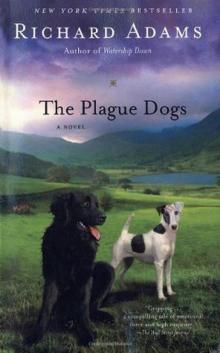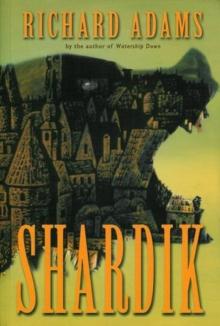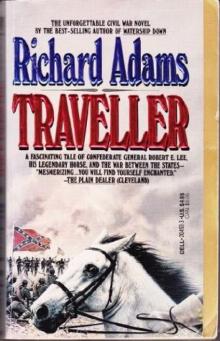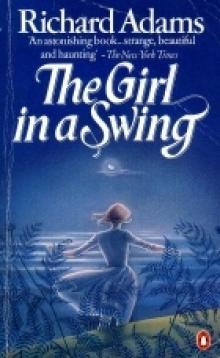- Home
- Richard Adams
Shardik Page 14
Shardik Read online
Page 14
Stumbling and still half-drowned, he began to follow Shardik up the slope of the shore but tripped and fell his length. For some moments he lay inert, then raised himself on one elbow. As he did so two men appeared from behind the nearest hut, carrying an iron cauldron between them and making for the water. They were bleary-eyed and tousled, scullions routed out of bed to the first chores of the day. The bear was almost on top of them before they looked up and saw it. The cauldron fell to the stones with a booming sound and for an instant they stared, fixed in grotesque attitudes of shock and terror. Then, shrieking, they turned to run. One disappeared by the way he had come. The other, blind with fear, blundered into the wall of the hut, hit his head and stood dazed, swaying on his feet. Shardik, following, reared up and struck him. The blow knocked the poor wretch bodily through the wattle-and-daub of the hut wall, smashing it open in a ragged gap. Shardik struck a second time and the wall collapsed, bringing down part of the roof above. The air was filled with dust, and with smoke from the new-lit hearth buried beneath the ruins. Women were screaming, men running and shouting. A burly man in a leather apron, holding a hammer, appeared suddenly through the haze, stared a moment, petrified, and was gone. Above all the hubbub rose the growling roar of Shardik, a sound like the sliding of heavy stones down a hillside.
Kelderek, watching from where he had fallen, saw the bear lumber away into the smoke and confusion. Suddenly he felt hands under his armpits and a voice shouted in his ear.
"Get up, Kelderek, get up, man! There's no time to lose! Follow me!"
Ta-Kominion was beside him, his long hair streaming water as he dragged Kelderek to his knees. In his left hand he was holding a long, sharp-pointed dagger.
"Come on, man! Have you got a weapon?"
"Only this." He drew Sheldra's knife.
"That'll do! You can soon grab yourself a better."
They dashed forward around the burning ruins. On the farther side was lying a man's body, the backbone like a snapped bow. Beyond, the bear was dragging the carcass of a sheep from beneath the debris of a second hut. A little farther off, four or five men, on the point of flight, stood staring back over their shoulders.
Ta-Kominion leapt to the top of a pile of logs, shouting, "Shardik! Lord Shardik is come!" Round him the tumult spread wider as the whole town woke to the alarm. It was clear that there were those who had been awaiting his return. Already men were gathering about him, some already armed, others, half-naked from their beds, clutching spits, axes, clubs, whatever had come first to hand.
Dragging the end of a burning roof-pole from the ruins behind him, Ta-Kominion brandished it above his head. The second hut had caught fire and smoke had begun to obscure the sunlight. As the heat and noise increased, Shardik, disturbed from the sheep's carcass, became uneasy. At first he had glared about him, defying the strange surroundings as he satisfied his hunger, crouching in the posture of a cat to rip and chew the bloody flesh. As the dusky air began to waver and cinders blew out toward the river, he winced and snarled, cuffing at a spark that fell on his ear. Then, as the center-post of the second hut fell its length with a crash like that of a felled tree, he turned, still clutching the haunch in his mouth, and made off toward the shore.
Ta-Kominion, surrounded now by a shouting crowd, pointed with his dagger and raised his voice above the din. "Now you have seen for yourselves! Lord Shardik has returned to his people! Follow me and fight for Shardik!"
"He is going!" cried a voice.
"Going? Of course he's going!" yelled Ta-Kominion. "Going where we shall follow him--to Bekla! He knows Ortelga's as good as taken for him already! He's trying to tell you there's no time to be lost! Follow me!"
"Shardik! Shardik!" shouted the crowd. Ta-Kominion led them forward at a run toward the Sindrad. Kelderek heard the shouting grow to a roar. Fresh smoke rose, followed by the unmistakable sounds of fighting--orders, the clashing of weapons, curses and the cries of wounded men. Picking up a stout, woven hurdle leaning against the log pile, he began to fasten it on his left arm for a shield. It was awkward, contrary work and he knelt down to it, fumbling and forcing at the wicker plaiting.
Looking up, he suddenly found the Tuginda standing beside him. Her clothes were dry, but the black, powdery ash blowing in the air had streaked her face and arms and lay grimy on her hair. Although she was carrying a bow, ready strung, and a quiver of arrows, she seemed indifferent to the fighting, which was now filling the entire town with its uproar. She said nothing, but, stood looking down at him.
"I must go and join in the fight, saiyett," he said. "The young baron will think me a coward. He may be hard-pressed--I cannot tell."
Still she said nothing and he paused, looking up at her and at the same time trying to thrust his left arm farther through the rent which he had made in the hurdle.
"Lord Shardik is leaving Ortelga," said the Tuginda at length.
"Saiyett, the fighting--"
"His work here is done--whatever it may have been."
"You can hear that it is not! Do not delay me, saiyett, I beg you!"
"That may be others' work. It is not our work."
He stared at her.
"Why, what then is our work, if not to fight for Lord Shardik?"
"To follow the one whom God has sent."
She turned and began to walk back toward the river. Still hesitating, he saw her stoop and pick something up from among the ashes of the burned hut. She stood a moment, weighing it in her hand, and as she moved he saw that it was a wooden ladle. Then she was gone, through the smoke, down the sloping shore. Kelderek let fall his hurdle, thrust the knife into his belt and followed her.
On the bank, Rantzay and Sheldra were waiting beside a canoe drawn up on the pebbles. Staring out over the water, they paid him no attention. Following their gaze, he saw Shardik splashing toward the mainland, along the line of the broken causeway. Close by, shading her eyes against the glitter, the Tuginda was standing on a flat, squared block of stone in the shallows. He took her arm, and together they began to follow Shardik across the strait.
BOOK II
Gelt
17 The Road to Gelt
THAT EVENING THE ARMY OF ORTELGA, led by Ta-Kominion, began crossing the strait: a grimy, shouting horde a few thousand strong, some armed with spear, sword or bow, some carrying nothing but mattocks or sharpened stakes; some--mostly servants, these--moving in bands under their masters for officers, others mere gangs of drinking companions or ruffians slouching with club and bottle for company; but all eager to march and ready to fight, all convinced that Bekla was destined to fall to the revealed power of God, by whose will they were to have full stomachs and never toil again. Some wore crude armor--scooped-out caps of fire-hardened wood, or rough-edged plates of iron fastened across their chests--and most had, scratched or painted somewhere about them, the rough likeness of a bear's head.
At the dangerous points in the broken causeway Ta-Kominion had had ropes stretched between wedged stakes or anchored rafts and at these there was sousing and horseplay, until a man was swept downstream and drowned. As darkness came, those still gathering on the island shore fell to drinking and singing as they waited for moonrise; and Ta-Kominion's henchmen made a last search through the town, rousing up any who remained in two minds or seemed inclined to feel that they might be leaving more than they could gain.
On the mainland shore other groups were mustering from the outlying lands: a party of foresters and woodmen armed with their axes, mauls and crowbars; a baron named Ged-la-Dan, whose substance came from the colored quartz--topaz and aquamarine--for which his men dived in rocky bays downstream; and a factor and his porters, just returned from their trading post in Gelt with a load of iron ore, who were quick-witted enough to auction themselves as guides to the highest bidders among the leaders.
Women, too, made the crossing, laden with arms, clothes, arrows or bags of food got together at the last minute, beg borrow or steal. Some of these, confused by the crowd, wandered here and
there in the torch-lit twilight, calling the names of their men and dealing as best they could with importuners and thieves.
Ta-Kominion, having asked Fassel-Hasta to count the numbers and do his best to organize the force into companies, himself set off to recross the causeway, ignoring the surly nod and grunt with which the older baron left him. For some hours past he had been drenched through, first standing up to his waist in midstream to see the ropes fixed and then remaining at the gaps, less to encourage the rabble, most of whom were in high spirits, than to establish his authority and make sure that they knew him and would know him again. Already wearied by the work of the previous night and day, he was not intending a second night without sleep. He waded ashore on Ortelga, commandeered the nearest hut, bolted the food that was brought to him and then slept for two hours. When his servant Numiss woke him, the moon was well risen and the stragglers were being guided and coaxed across. He sat impatiently while Numiss changed the dirty cloth bound round the deep, jagged wound in his forearm; and then made his way upstream the length of the town, until he came to the shendron's post under the zoan tree.
There was no shendron there now, not even a woman or an old man, for Ta-Kominion was not concerned to set guards around Ortelga. Waiting, however, under the tent of leaves he found, as he had expected, two of the Tuginda's girls with a canoe. Numiss and another had been dispatched that morning, as soon as the fight was over, to cross the strait, find the Tuginda and ask for guides to be sent to the zoan tree after moonrise.
As the canoe moved obliquely across the midstream current and on into the slack water under the far bank Ta-Kominion, sitting in the stern, could make out, away to his left, the dull glint of weapons held high out of the water, an occasional splash --the sound reaching him an instant after the quick glitter in the moon--and the onward creeping of the line of black shapes as the last of his followers made the crossing. Coming ashore he stumbled, struck his arm against a tree and stood biting his lip as the pain slowly subsided. All day he had made light of the wound but now, when one of the girls unfastened the leather strap of her quiver to make him a rough sling, he was ready enough to do as she bid, bending his head meekly to let her tie the knot behind his neck.
The girls had become adept at moving in the dark. Whether they were following any path or how they knew their way he could not tell and was beginning to feel too feverish to care. His arm throbbed and his hearing seemed continually to change, now magnified, now dulled. He walked behind them in silence, revolving in his mind all that still remained to be done. At length he saw, far off, the leaping of a fire between the trees. He went toward it, halting as his guides were challenged and answered with some password. Then he stepped into the firelight and Kelderek came forward to meet him.
For a few moments they stood looking at one another, each thinking how strange it was that in spite of all that had passed he should not yet be familiar with the other's face. Then Kelderek dropped his eyes to the fire, stooped and threw on a log, speaking diffidently as he did so.
"Crendro, Ta-Kominion. I am glad that you have won Ortelga, but sorry to see you wounded. I hope you found the girls waiting?"
Ta-Kominion nodded and sat down on a creeper-covered log. Kelderek remained standing, leaning on a long stake which the girls had been using to stir the fire.
"Is the wound serious?"
"It's of no importance. Others were luckier--others who won't be afraid to fight again."
"How long did the fight last?"
"I don't know. Longer than it took you to get across the strait, I dare say."
He pulled a splinter from the log. A turn of the breeze blew the smoke into his face but he ignored it. Kelderek stirred the fire and shifted his feet. At length he said, "Most of the Tuginda's stuff is still on the other side. The women left it this morning when they followed us across the river."
There was another silence.
"It puzzles me," said Kelderek, "that last night, in spite of his hunger, Lord Shardik would not go on through the forest. He must have caught the scent of food from Ortelga, yet he turned back from the Dead Belt and took to the river."
Ta-Kominion shook his head as though the matter were of little interest to him.
"What has happened to Bel-ka-Trazet?" asked Kelderek.
"Oh, he took to the water, like you; not quite so quickly."
Kelderek drew in his breath and clenched his hand on the stake. After some moments he said,
"Where has he gone?"
"Downstream."
"Do you mean to pursue him?"
"It's not necessary. He isn't a coward, but to us he can be no more dangerous now than if he were." He looked up. "Where is Lord Shardik?"
"Over there, not far from the road. He reached the road this afternoon but then went back into the forest. I was near him until moonrise, but I returned to meet you."
"What road?"
"The road to Gelt. We are not far from it here."
Ta-Kominion got up and stood squarely in front of Kelderek, looking down into his face. His back was to the fire and, with his long hair falling forward, he seemed to be wearing a mask of heavy shadows, through which his eyes burned cold and harsh. Without turning his head he said, "You may leave us, Numiss."
"But where are we to go, my lord?"
Ta-Kominion said nothing more and after a moment the red-haired fellow and his companion slipped away among the trees. Before Ta-Kominion could speak again Kelderek burst out,
"My place is with Lord Shardik, to follow and serve him! That is my task! I am no coward!"
"I did not say you were."
"I have walked beside Lord Shardik, slept beside him, laid my hands upon him. Is that work for a coward?"
Ta-Kominion closed his eyes and passed his hand once or twice across his forehead.
"I did not come here, Kelderek, either to accuse you or to quarrel with you. I have more important things to speak of."
"You think I'm a coward. You have as good as said so!"
"What I may have let slip is nothing to do with our affairs now. You'd do better to put such personal ideas out of your mind. Every man in Ortelga who can use a weapon is across the Telthearna and ready to march on Bekla. They'll start soon--before dawn. I shall join them from here--no need to return to the camp. We shall be at Bekla in five days--perhaps sooner. It's not only surprise we need. We've got no more than three days' food, but that's not the whole of it either. Our people have got to take Bekla before they can lose the power that's burning in their hearts. Whose, do you suppose, is that power?"
"My lord?" It had slipped out before Kelderek could check himself.
"It was the power of Shardik that took Ortelga today. We were lucky--there were many who saw him before he crossed the causeway. Bel-ka-Trazet was driven out because he was known to be Shardik's enemy. The people have seen for themselves that Shardik has returned. They believe there's nothing he won't give them--nothing they can't do in his name."
He took a few uncertain steps back to the log and sat rigid and frowning, fighting a sudden fit of giddiness. For an instant his teeth chattered and he pressed his chin upon his open hand.
"Shardik has been sent to restore us to Bekla, peasant and baron alike. The peasants need to know no more than that. But I--I have to find the right way, the way to bring about victory through Shardik. And this is the way--or so it seems to me. Either we take Bekla within seven days or not at all."
"Why?"
Ta-Kominion paused, as though choosing his words.
"Common people can sing a song only when they are dancing, drinking or about some occupation--then it rises to their lips without thought. Ask them to teach it to you and it's gone from their heads. While their hearts are full of Shardik our men will do the impossible--march without sleep, fly through the air, tear down the walls of Bekla. But in the hearts of common men such power is like mist. The wind or the sun--any unexpected adversity--may disperse it in an hour. It must be given no chance to disperse." He pause
d and then said deliberately, "But there is more besides. Out of sight, out of mind. You understand children, I'm told. So you'll know that children forget what is not kept before their eyes."
Kelderek stared, guessing at his meaning.
"Shardik must be with us when we come to fight," said Ta-Kominion. "It is all-important that the people should see him there."
"At Bekla--in five days? How?"
"You must tell me how."
"Lord Shardik cannot be driven a hundred paces and you are speaking of five days' journey!"
"Kelderek, Bekla is a city more rich and marvelous than a mountain made of jewels. It is ours by ancient right and Shardik has returned to restore it to us. But he can restore it only by means of ourselves. He needed my help to take Ortelga today. Now he needs your help to bring him to Bekla."
"But that is impossible! It was not impossible to take Ortelga."
"No, no, of course not--an easy matter, I dare say, to those who did not happen to be there. Never mind. Kelderek, do you want to cease to be a simpleton playing with fatherless children on the shore? To see Shardik come in power to Bekla? To bring to its right end the work you began on that night when you faced Bel-ka-Trazet's hot knife in the Sindrad? There must be a way! Either you find it or we are fast on a sheer cliff. You and I and Lord Shardik--it is we who are climbing, and there is no way back. If we do not take Bekla, do you think the Beklan rulers will let us alone? No--they will hunt us down. They will not be long in dealing with you and your bear."
"My bear?"
"Your bear. For that is what he will become, Lord Shardik of the Ledges, who is ready at this moment to give us a great city and all its wealth and power, if only we can find the means. He will shrink to a creature of superstition, over which some rough fellows on Ortelga have made trouble and turned out their High Baron. A stop will be put to him--and to you."

 Watership Down
Watership Down Tales From Watership Down
Tales From Watership Down Maia
Maia The Plague Dogs
The Plague Dogs Shardik
Shardik Traveller
Traveller The Girl in a Swing
The Girl in a Swing The Day Gone By
The Day Gone By Daniel
Daniel The Plague Dogs: A Novel
The Plague Dogs: A Novel